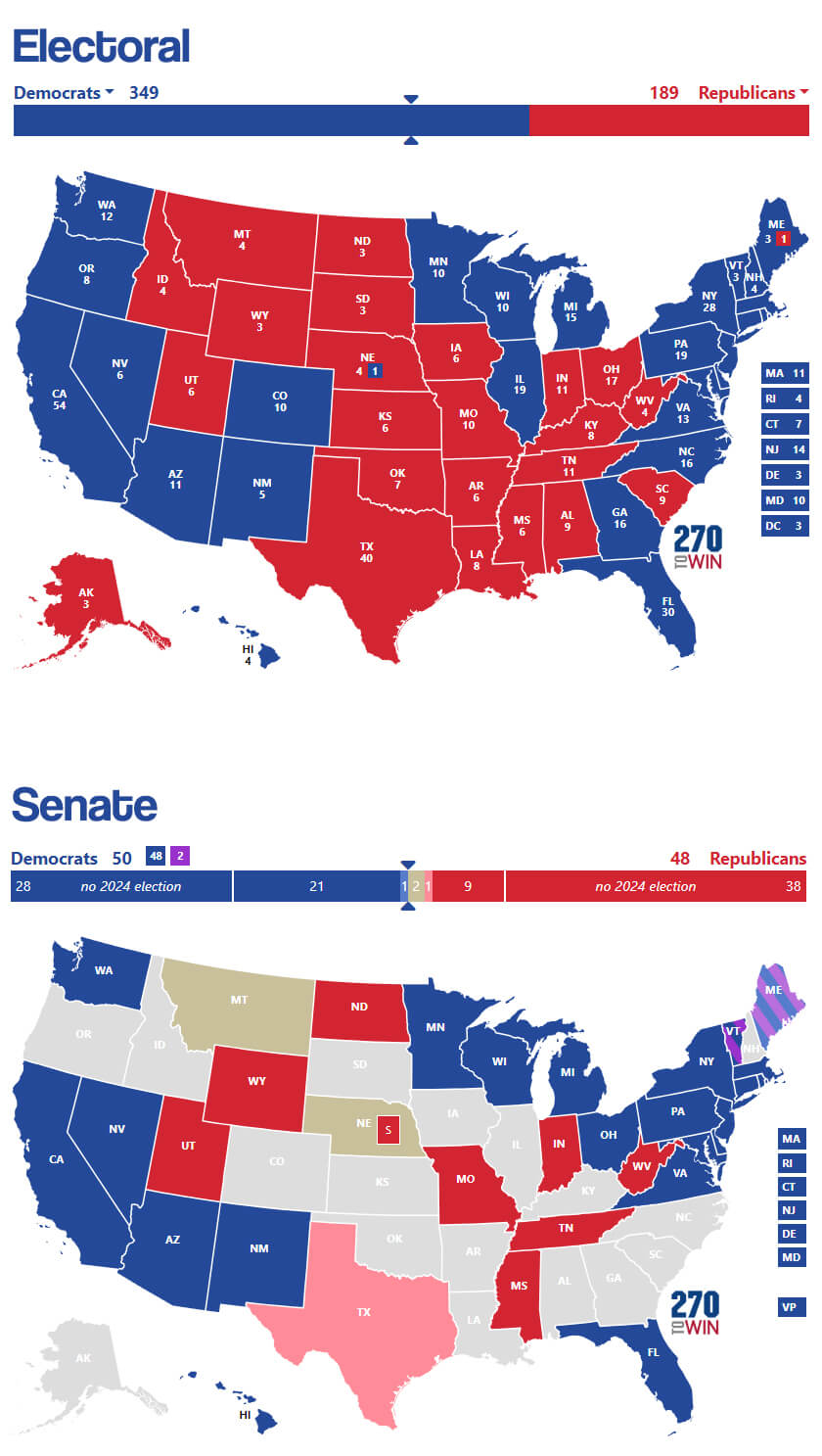(Per Aspenglow’s moderation, I’m bringing this discussion over to this thread from the Kamala run-up thread.)
Christopher Bouzy’s final Electoral College prediction came out yesterday evening (map below). Now, I know Bouzy weighs and scores his inputs far differently than more famous aggregators like FiveThirtyEight, Nate Silver, and the NYT’s Nate Cohn. Additionally, Bouzy’s analysis isn’t strictly poll-based. Still, I’m interested to see another “minority report” among the wide swath of prognosticators.

One of the strikes, perhaps, against Bouzy’s work is that very little of his analysis is given in printed form. Instead, he delivers his work via podcast and similar oral presentations. I’ve not even been able to dig up a transcript anywhere. Therefore, information about Bouzy’s analysis tends to spread across various liberal channels via the electronic analog of “word of mouth” – for example, I found out about Bouzy from the Comments sections of some liberal Substacks. Were I on social media, I’d probably have run across him somewhere in someone’s Facebook comments, or someone uploading one of Bouzy’s maps to Instagram or something like that.
Further exacerbating the lack of printed analysis, yesterday’s (Wed 10/30) podcast detailing Bouzy’s Electoral College final-map analysis had some kind of snafu that silenced the audio about 1/4 of the way in. To that point, Bouzy had been beating around the bush a bit and had really only said that early voting modeling wasn’t going to be particularly indicative of final general election results (FWIW, an opinion he shares with Nate Silver).
Bouzy does have a prior podcast from mid-September (72 minutes) that goes through his reasoning for his provisional seven-weeks-out electoral map (succinctly: Harris wins all seven swing states plus Florida, Ohio and Iowa too close to call at the time). Presumably, his reasoning to predict Harris sweeping the battlegrounds + Florida was given during his September podcast (disclosure: I have not listened to it).
…
So, alright. In the Kamala run-up thread, @Win_Place_Show reasonably asked me this (my emphasis):
Not to take away from the “is polling broken” conversation, but can you let us know, is there any reason why we should trust this Bouzy guy over any of the other prognosticators that have it “too close to call”?
My answer is that, no, there probably isn’t a purely logical reason to trust Bouzy (or, say, Carl Allen) over the bigger names such as Nate Silver or G. Elliot Morris. I can explain why I look to alternatives to the big names, however.
For one, not mere polling but prognostication – even prediction – is necessarily an inexact exercise. The analyses out there cover a wider gamut than the big names alone suggest. Not being in line with Silver or FiveThirtyEight doesn’t necessarily mean “it’s off somehow”. I think other researchers and analysts can start with the publicly available polling data, add in a boutique set of weights and factors (which all of the prognosticators do) and draw reasonable and valid conclusions that differ from the highest-profile analyses. And I want to see such conclusions, not merely another one saying “yeah, I think it’s a toss-up, too.”
Secondly, while I’ve never performed a deep-dive into Bouzy’s analysis** … most of Silver’s and Morris’ analysis is also a black box to me as well. I don’t hold having a low profile against Bouzy and, say, Allen. Through intermediaries, I have been able to latch on to superficial pieces of Bouzy’s reasoning and indeed agree with much of it (e.g. that the Florida and Arizona referenda will significantly impact turnout to Harris’ favor) – so the presentation of his maps, for me, is not completely inscrutable.
Lastly, I must cop to some motivated reasoning. I want to believe that Trump’s victory is not pre-ordained. And while Silver and Morris would say “We’re not saying THAT” … if someone can’t come out and at least say “Harris is in good shape,” what’s the alternative? Refusal to make a pass/fail prediction is not particularly palatable – give me the Alan Lichtmans and Christopher Bouzys who are willing to stand out on that ledge. That at least gives something to believe in.
** On the other hand, I have snorkeled a bit into Carl Allen’s.
